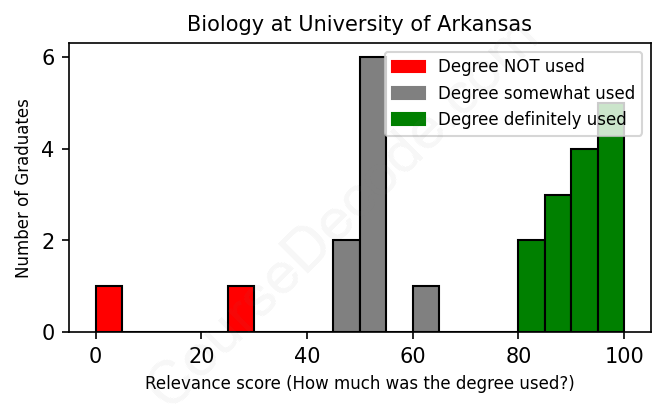
First, some facts. Of the Biology graduates from University of Arkansas we've analyzed , here's how many have used (or NOT used) their degree in their career:

These are estimates based on AI analysis of 25 LinkedIn profiles (see below).
The verdict? Slightly above average. Overall, with an average relevance score of 70%, Biology graduates from University of Arkansas have a slightly higher likelihood (+3%) of finding work in this field compared to the average graduate across all fields:
And for comparison, here's the chart for all profiles we've looked at across all degrees.
Also, after graduating, 84% of these graduates have pursued further education other than another Bachelor's degree (such as a Masters degree or other), compared to the average across all profiles of 35%. This suggests you may need more than just a Bachelors degree to be competitive as a Biology graduate.
See the details:
|
Relevance score: 81% We think this person has gone into a career highly relevant to their degree. We think this person has gone into a career highly relevant to their degree.
DEGREE INFOGraduated in 2021 from University of Arkansas with a Bachelor of Science - BS in Biology. Also pursued further education since (see below). JOB HISTORY SINCE GRADUATIONResearch/Lab Technician II University of Missouri-Columbia Jul 2021 - Nov 2021 Assistant Scientist I  Eurofins BioPharma Product Testing (US) Nov 2021 - Mar 2023 Scientist I - Biochemistry  Eurofins BioPharma Product Testing (US) Mar 2023 - Jul 2023 Pharmacy Intern  Hy-Vee, Inc. Sep 2023 - Present Pharmacy Intern  University of Missouri Health Care May 2024 - Present FURTHER DEGREES DONE SINCE GRADUATINGDoctor of Pharmacy - PharmDUniversity of Missouri-Kansas City 2023 - 2027 ABOUTNo information provided. |
The top 10 most common jobs done by the graduates we've analyzed (ranked most common to least) are:
Here is a visual representation of the most common words in job titles for Biology graduates (this is across all Biology graduates we've analyzed, not just those who went to University of Arkansas):

Graduates from the University of Arkansas with a degree in Biology appear to have a diverse set of career trajectories, with many establishing themselves in fields related to healthcare and research right after finishing their studies. For instance, it's common to see early career moves into roles like lab technicians, teachers, and pharmacy technicians within the first few years post-graduation. This suggests that many graduates leverage their biology knowledge into hands-on positions in medical or science-related settings early in their careers. Positions like graduate assistants and research professionals highlight a trend toward further education or specialized research roles, especially for those who continue in academia or scientific research institutes.
As time goes on—around the 5 to 10-year mark—many graduates seem to progress into more advanced, responsible roles. The mix of roles in pharmacy, teaching, research management, and even specialized fields like orthodontics or optometry points to a solid career path for those who stay connected to their biology roots. However, there are a few cases where graduates have pivoted significantly away from traditional biology-related fields, engaging in roles in education management or platforms unrelated to their degree. Overall, many alumni from this program appear to be doing well and finding their niche in various sectors, including healthcare, education, and research, although there are some who have ventured into seemingly unrelated domains as their careers evolve.
Honestly, a Bachelor’s degree in Biology can be a bit of a mixed bag, and it really depends on your interest in the subject and how you handle challenging coursework. At the University of Arkansas, like at many schools, you’ll dive into some tough topics like genetics, microbiology, and ecology, and the labs can be pretty intense. If you're passionate about biology, you might find it enjoyable and manageable, but if science isn't your jam, it could feel overwhelming at times. Overall, it's on the harder side compared to some other majors, mainly because of the heavy emphasis on understanding complex concepts and doing hands-on lab work. Just make sure you're ready to put in the effort, and it can definitely be a rewarding experience!
Most commonly, in the LinkedIn profiles we've looked at, it takes people 4 years to finish a Bachelor degree in Biology.
Looking at the job paths of these University of Arkansas biology grads, it seems like some of them have landed pretty solid gigs, while others are probably earning a bit less, especially in the early parts of their careers. For instance, those who went into healthcare, like pharmacists and orthodontists, are likely doing well financially, considering those fields generally pay well. The Navy and teaching roles also appear relatively stable, though they may not have the highest salaries. Meanwhile, some entry-level positions like lab technicians or teaching assistants might not be breaking the bank just yet. Overall, it seems like there’s a decent mix, with several folks on trajectories that could lead to a good income, but it just depends on where they’re at in their careers right now.
Here is a visual representation of the most common words seen in the "about" section of LinkedIn profiles who have a Bachelor degree in Biology (this is across all Biology graduates we've analyzed, not just those who went to University of Arkansas). This may or may not be useful:

Here are all colleges offering a Bachelor degree in Biology (ordered by the average relevance score of their Biology graduates, best to worst) where we have analyzed at least 10 of their graduates: